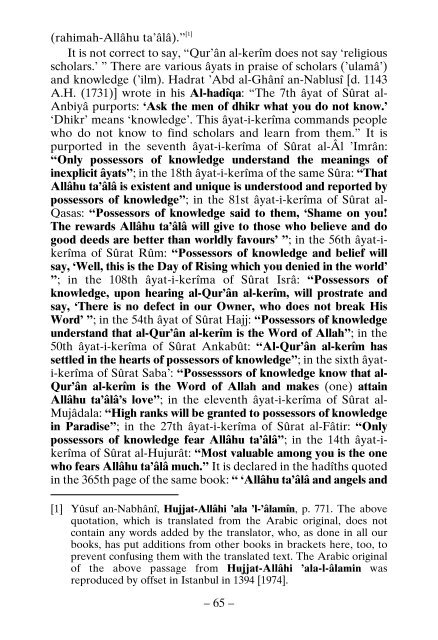Belief and Islam
BELIEF AND ISLAM star This work, Belief and Islam, originally was written in Persian under the title I’tiqâd-nâma by Hadrât Mawlânâ Khâlid al-Baghdâdî, a profound ‘âlim of Islam and a specialist in ma’ârif of tasawwuf. Hâji Faydullah Effendi of Kemah, a khalîfa of great walî Mavlânâ Mahmûd Sâhib, the brother of the author, translated the book into Turkish and named it Farâid-ul-fawâid which was printed in Istanbul in 1312 A.H.[1894]. Our bookstore had it translated again from the Persian original into Turkish and, some explanations and three chapters, published it with the title Imân ve Islâm in 1966. German, French and Arabic versions are also published by our bookstore. This book, explains five fundamentals of Islam, six fundamentals of îmân and the contemporary information about the matter and refutes those who are against Islam and those who are lâ-madbhabî.
BELIEF AND ISLAM
star This work, Belief and Islam, originally was written in Persian under the title I’tiqâd-nâma by Hadrât Mawlânâ Khâlid al-Baghdâdî, a profound ‘âlim of Islam and a specialist in ma’ârif of tasawwuf. Hâji Faydullah Effendi of Kemah, a khalîfa of great walî Mavlânâ Mahmûd Sâhib, the brother of the author, translated the book into Turkish and named it Farâid-ul-fawâid which was printed in Istanbul in 1312 A.H.[1894]. Our bookstore had it translated again from the Persian original into Turkish and, some explanations and three chapters, published it with the title Imân ve Islâm in 1966. German, French and Arabic versions are also published by our bookstore. This book, explains five fundamentals of Islam, six fundamentals of îmân and the contemporary information about the matter and refutes those who are against Islam and those who are lâ-madbhabî.
You also want an ePaper? Increase the reach of your titles
YUMPU automatically turns print PDFs into web optimized ePapers that Google loves.
(rahimah-Allâhu ta’âlâ).” [1]<br />
It is not correct to say, “Qur’ân al-kerîm does not say ‘religious<br />
scholars.’ ” There are various âyats in praise of scholars (’ulamâ’)<br />
<strong>and</strong> knowledge (’ilm). Hadrat ’Abd al-Ghânî an-Nablusî [d. 1143<br />
A.H. (1731)] wrote in his Al-hadîqa: “The 7th âyat of Sûrat al-<br />
Anbiyâ purports: ‘Ask the men of dhikr what you do not know.’<br />
‘Dhikr’ means ‘knowledge’. This âyat-i-kerîma comm<strong>and</strong>s people<br />
who do not know to find scholars <strong>and</strong> learn from them.” It is<br />
purported in the seventh âyat-i-kerîma of Sûrat al-Âl ’Imrân:<br />
“Only possessors of knowledge underst<strong>and</strong> the meanings of<br />
inexplicit âyats”; in the 18th âyat-i-kerîma of the same Sûra: “That<br />
Allâhu ta’âlâ is existent <strong>and</strong> unique is understood <strong>and</strong> reported by<br />
possessors of knowledge”; in the 81st âyat-i-kerîma of Sûrat al-<br />
Qasas: “Possessors of knowledge said to them, ‘Shame on you!<br />
The rewards Allâhu ta’âlâ will give to those who believe <strong>and</strong> do<br />
good deeds are better than worldly favours’ ”; in the 56th âyat-ikerîma<br />
of Sûrat Rûm: “Possessors of knowledge <strong>and</strong> belief will<br />
say, ‘Well, this is the Day of Rising which you denied in the world’<br />
”; in the 108th âyat-i-kerîma of Sûrat Isrâ: “Possessors of<br />
knowledge, upon hearing al-Qur’ân al-kerîm, will prostrate <strong>and</strong><br />
say, ‘There is no defect in our Owner, who does not break His<br />
Word’ ”; in the 54th âyat of Sûrat Hajj: “Possessors of knowledge<br />
underst<strong>and</strong> that al-Qur’ân al-kerîm is the Word of Allah”; in the<br />
50th âyat-i-kerîma of Sûrat Ankabût: “Al-Qur’ân al-kerîm has<br />
settled in the hearts of possessors of knowledge”; in the sixth âyati-kerîma<br />
of Sûrat Saba’: “Possesssors of knowledge know that al-<br />
Qur’ân al-kerîm is the Word of Allah <strong>and</strong> makes (one) attain<br />
Allâhu ta’âlâ’s love”; in the eleventh âyat-i-kerîma of Sûrat al-<br />
Mujâdala: “High ranks will be granted to possessors of knowledge<br />
in Paradise”; in the 27th âyat-i-kerîma of Sûrat al-Fâtir: “Only<br />
possessors of knowledge fear Allâhu ta’âlâ”; in the 14th âyat-ikerîma<br />
of Sûrat al-Hujurât: “Most valuable among you is the one<br />
who fears Allâhu ta’âlâ much.” It is declared in the hadîths quoted<br />
in the 365th page of the same book: “ ‘Allâhu ta’âlâ <strong>and</strong> angels <strong>and</strong><br />
[1] Yûsuf an-Nabhânî, Hujjat-Allâhi ’ala ’l-’âlamîn, p. 771. The above<br />
quotation, which is translated from the Arabic original, does not<br />
contain any words added by the translator, who, as done in all our<br />
books, has put additions from other books in brackets here, too, to<br />
prevent confusing them with the translated text. The Arabic original<br />
of the above passage from Hujjat-Allâhi ’ala-l-âlamin was<br />
reproduced by offset in Istanbul in 1394 [1974].<br />
– 65 –

















